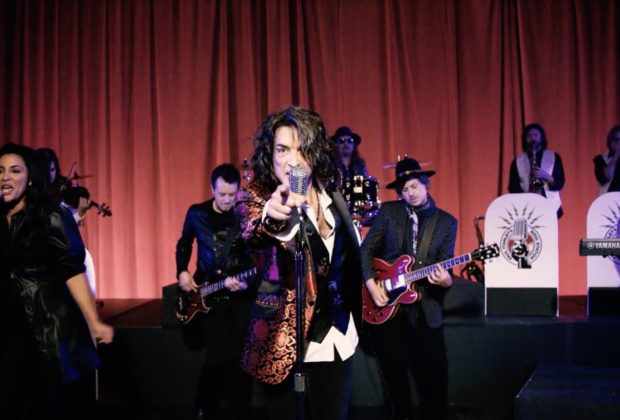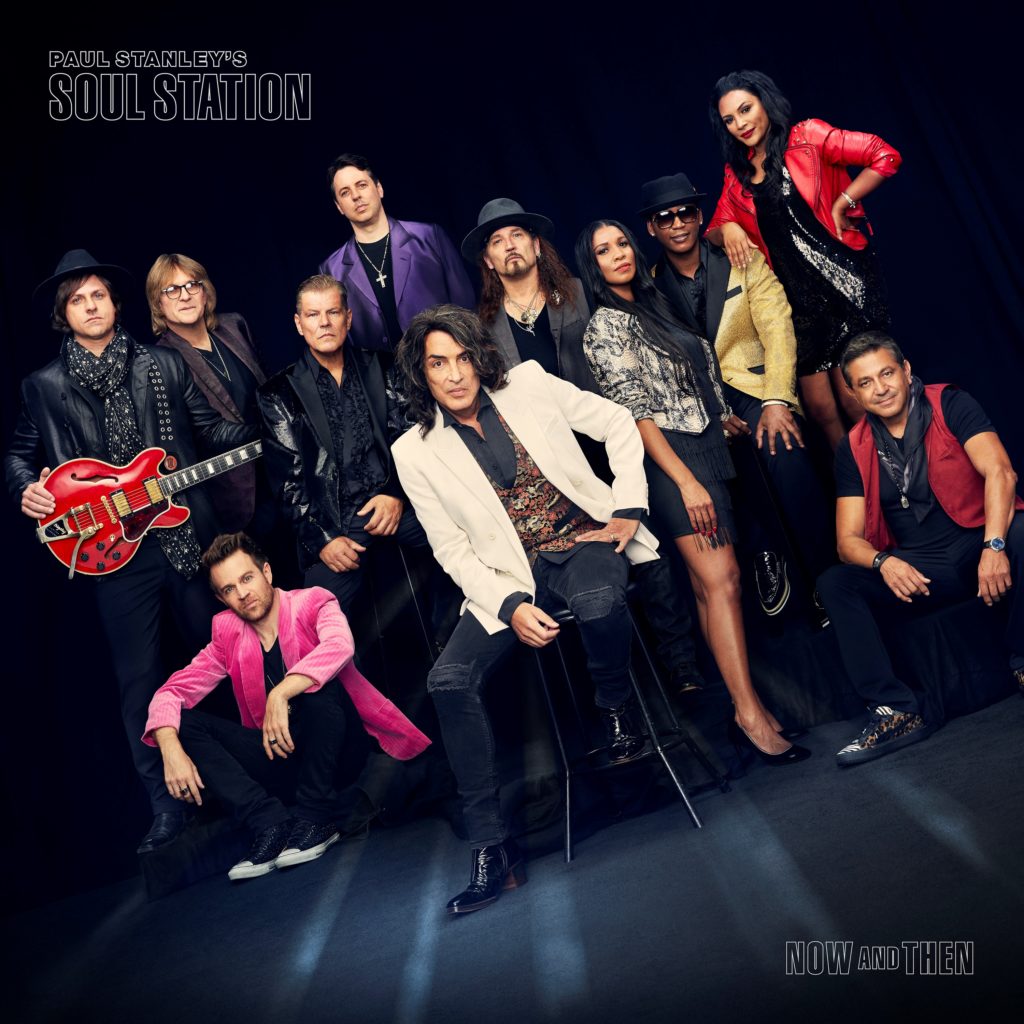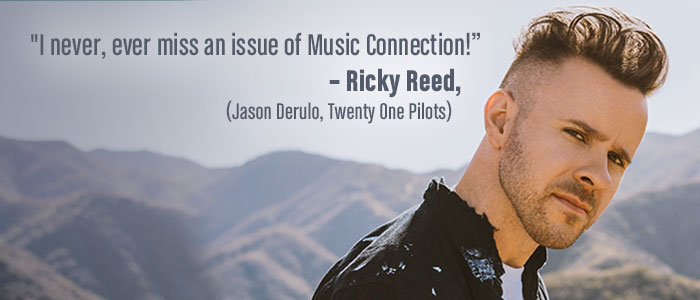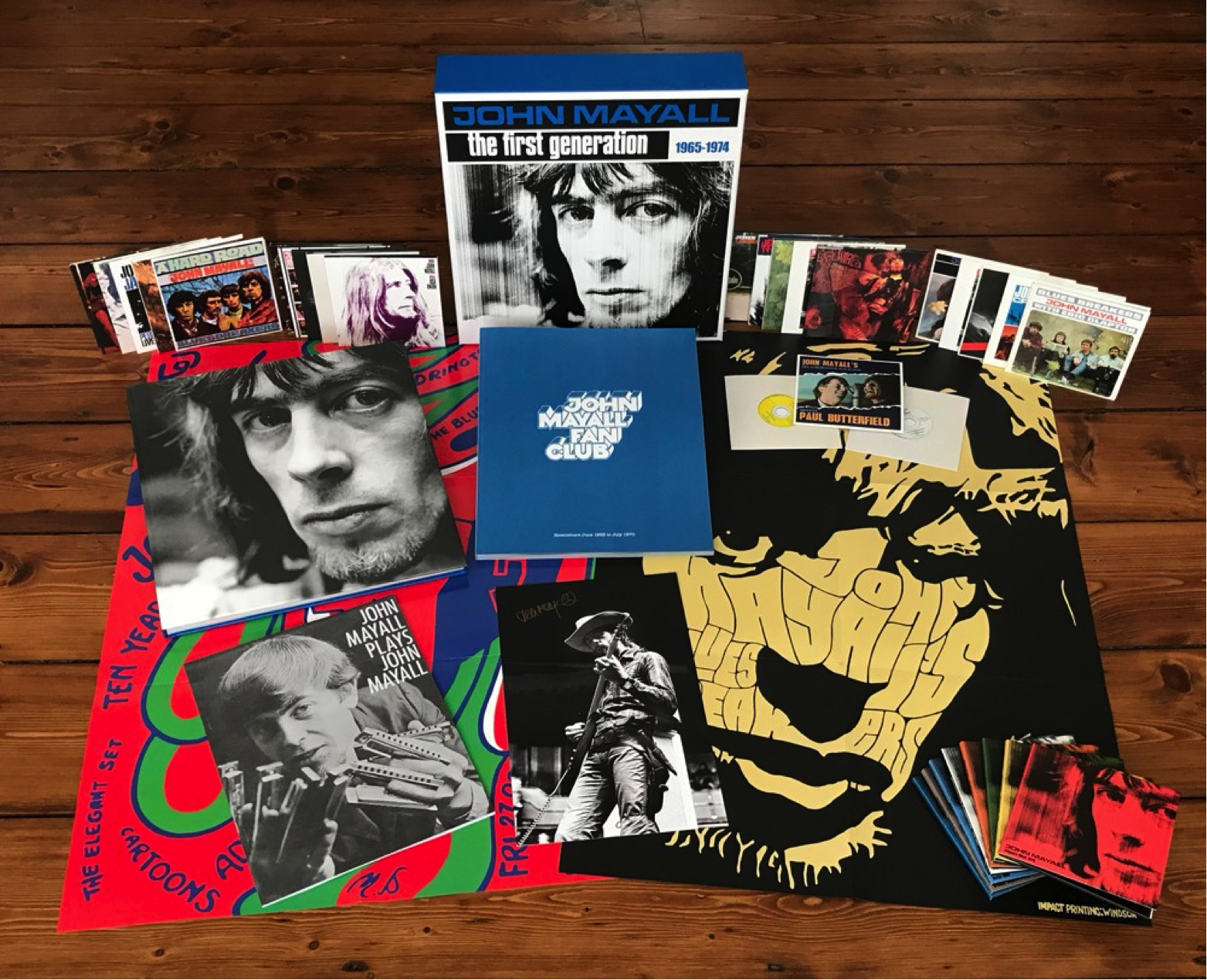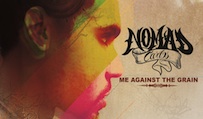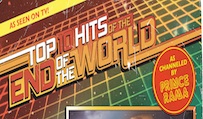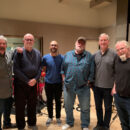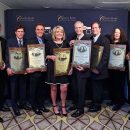Most people know Paul Stanley as the co-founder and frontman of Rock and Roll Hall of Fame band, Kiss, where when he is in makeup and costume on stage he is also known by his superhero [he is an official Marvel superhero, don’t forget) alter ego, the Starchild. But Stanley is also a successful painter, restaurateur, best-selling author, and Broadway musical star. He’s a man of many hats, but since 2015 he’s also been a Soul Man, fronting his passion project known as Soul Station, a 15-piece-ensemble that keep the blood pumping in those amazing Motown, Philly soul, and Stax/Volt R&B hits that have otherwise been relegated to oldies radio or samples in new hits. Up until March 5, Soul Station has just been a fantastic night out to get lost in lush, live music, but Now And Then (UMe) is now on wax! The first single “O-O-H Child” (The Five Stairsteps) got all the buzz, but Stanley has written five new old-school originals which fit right with the nine classics.
Music Connection: Soul Station painstakingly and authentically approaches these wonderful songs with a big band. It reminds me of a time when handclaps and cowbells weren’t just pads on a drum machine, not that there’s anything wrong with drum machines.
Paul Stanley: There really is some brilliant production and songwriting going on currently, it’s just a different animal than a live band, and particularly a 17-piece band. This music was unmistakably made by human beings. Flesh and blood. The fact is that this music has become relegated to being samples in rap tunes, and that’s okay, but we deserve and we should hear these songs in their entirety because they’re awesome, they’re timeless, they’re brilliant. They’re as good today as ever. Back in the day where this music originated nobody was going for perfection, they were going for passion. It wasn’t a matter of every note being perfect, it was a matter of how it felt. And that’s been replaced by a lot of people looking at computers rather than listening to see if it feels good. So, we wanted to go back to that without doing a paint by numbers project, without doing an impersonation or mimicry or karaoke. We wanted to impart our own personality on it but that doesn’t mean changing the character of what it is, it means respecting it and boosting the vitality. You know, the bloodlines of everybody in this band has been with a lot of the greats, and we weren’t trying to reinvent the wheel, maybe we wanted to polish it up some.
MC: You more than polished it up, you’ve added new songs to the soul canon that are hard to distinguish from the classics. Can you talk about how you approached making new old-school style songs?
Stanley: Most people have used the word seamless and that’s great because I didn’t want new and improved, I just wanted new. It doesn’t get any better than it was, so I just wanted more coming off the same tree as those other songs. I pretty much have a pretty good handle on what makes those songs tick, and I wasn’t trying to put on a different hat and say “let me write in this style,” it was more that I was immersed in it. I was in the studio, we were doing live shows, we were hanging out and socializing, so it wasn’t changing anything, it was just me going, “I’ll write some songs for Soul Station.” There were no second thoughts on my part on what they should be as far as structure, they just wrote themselves.
MC: What do you tell soul/R&B fans surprised to hear soul from a rocker, and Kiss fans who may be surprised that their Starchild has gone soul man?
Stanley: There’s two kinds of music, and that’s good and bad. I think that people do themselves a disservice when they might say, “I only listen to” and then you fill in the blank with whatever kind of music. It’s kind of like saying. “I only eat pizza.” It’s so limiting, forget about nourishment. The first music I heard was classical music, then Italian opera, then bluegrass and R&B, and the music that preceded Motown and Philly Soul. I love Sam Cooke, Jackie Wilson, and as a kid I saw Otis Redding and Solomon Burke. So, all this music is really part of the foundation of what I do and where I wound up, so, for me it’s not strange at all. But I can understand somebody who has only been exposed to the majority of what I do in public. I‘ve been singing these songs since they came out. I’ve been singing Smokey Robinson since Smokey was with the Miracles. It’s part of my wheelhouse, it’s my passion, it’s not a lark, and it’s not a vanity project, it’s a passion project
MC: Some soul/R&B fans and Kiss fans alike may not know how much soul went into some of those Kiss songs. For example, you told veteran Kiss-scribe, Ken Sharp, that your rap on “100,000 Years” was influenced by Stevie Wonder. Can you tell us some more?
Stanley: I think the idea of listening to different kinds of music is key, and it finds its way into music that you write. A song like “Shout It Out Loud” is so much the Four Tops, it’s just not arranged like that. The idea of the call and response of the lead vocal, and the backgrounds on the verses is “I Can’t Help Myself (Sugar Pie Honey Bunch).” [Chuckles] It’s classic Four Tops. Obviously, or not so obviously, the melody in the chorus of “I Was Made for Lovin’ You” is not far off from “Standing in the Shadows of Love,” again by Four Tops. There’s a song on Unmasked called “What Makes the World Go Round.” Although it’s not at all arranged or played in that form, but The Spinners could do that song. I think what makes music interesting is what you bring to it from outside of what you wind up sounding like, whether it’s Led Zeppelin or the Beatles, they were proud of and explored their influences.
MC: You reveal the soul influences on some Kiss songs, wouldn’t it be cool to hear soul artists do their versions of Kiss songs, the way Lenny Kravitz and Stevie Wonder did “Deuce” on the Kiss My Ass tribute record?
Stanley: Yeah, well, I don’t go knocking on doors to peddle songs, but if there is something that they like, well god bless them.
MC: Where did you write the new songs?
Stanley: I wrote them at home. Then Alex Alessandroni (who is just brilliant, and kind of the glue for this whole project; he was musical director for Whitney Houston, Natalie Cole, Cher, Christina Aguilera, and on and on), would come over and I would sing him the horn parts and then I would sing him the string parts and he would transcribe everything.
MC: Where did you record Soul Station?
Stanley: There is a great studio in the Valley, which is as old school and vibey as you could ever want, it is called Dave’s Room, and it is just a gem. I would say we did 98% of it there, and it just felt like home. It was originally owned by Freddie Piro. Back then it was called Mama Jo's, taken over by Dave Bianco who did {Tom Petty, Bob Dylan, Lucinda Williams, Alan Parsons, Ambrosia among others were recorded there}. When he passed away it was taken over by David Spreng & Paul Fig, who retains everything that made it what it was. It’s just an amazing room to record in. I want my buddy there to do great, but just want to make sure I can always get time there.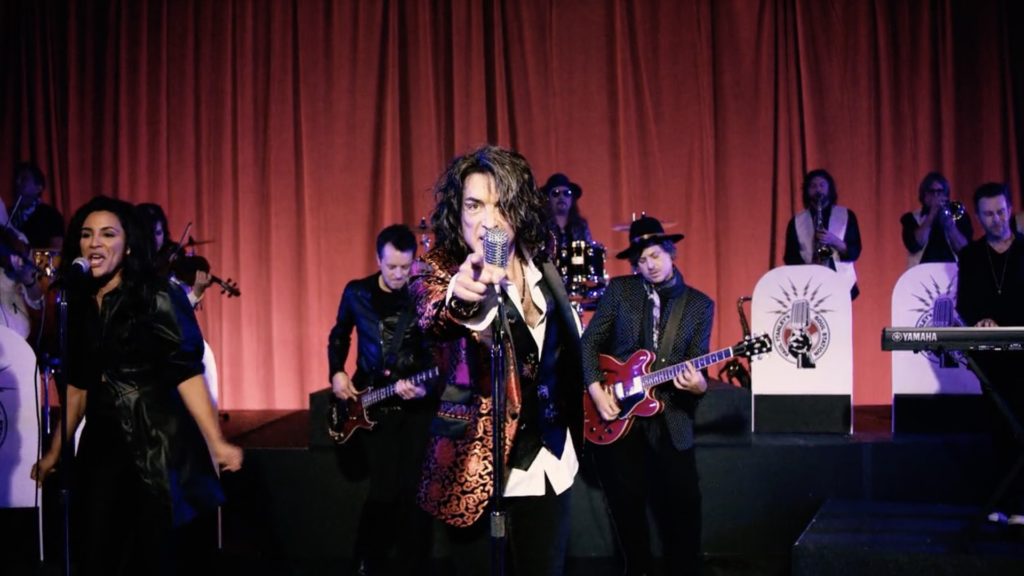
MC: The band is top-shelf, having played for the biggest names in the biz. And there’s a more familiar face on drums, Kiss bandmate Eric Singer. Was the shorthand that you share or comfort level that you have that were factors in having him join?
Stanley: From the day that I thought about putting this together, I hoped that Eric would want to be a part of it because he is just a consummate drummer and musician, and grew up playing in big bands with his dad. I just knew that he would be the first choice, because the idea of taking a “rock drummer” and putting him into this kind of music would be a disaster. Eric is so much more. It’s not about comfort level, because that would lead to complacency, but that’s not the case with him. No, the comfort with Eric comes from knowing just how good he is and what he’s capable of doing.
MC: Going back to the Casablanca Records days, you were on the same label as a #1 charting R&B supergroup with George Clinton, Bootsy Collins and Parliament Funkadelic. They also had a huge show, a “Starchild” character, and also wore costumes by Larry LeGaspi. Did you bump into them back then? What was your take on them?
Stanley: Larry LeGaspi did all of Labelle’s clothes, too. I thought [P-Funk] were terrific. From Parliament becoming Parliament-Funkadelic? That was awesome. Actually, in one of their early videos, Clinton is wearing Gene’s boots. [this can be seen in the TV commercial for Parliament’s 1974 album Up for the Downstroke].
MC: And Rick James was heavily influenced by P-Funk and Kiss. He wore similar stage clothes, poses with Gene’s axe bass on one of the album covers, and aren’t there more connections?
Stanley: I would say that is on record, and happily so from Rick James, that he was totally inspired by what we were doing. We were staying at the same hotel near Washington, D.C. and we invited him to the show, which is when he wrote a song called “Love Gun” and basically came up with his whole look, and that’s coming from him. I’m certainly proud of that. In its finest form, when politics and everything is put aside, music crosses all boundaries.
MC: That reminds me of how Kiss crossed over with a disco hit, “I Was Made for Lovin’ You,” but it’s ironic that the rock band that went disco was also, as your friend Nile Rogers has talked about, a huge influence on Chic, one of the greatest disco acts. Who would have thought?
Stanley: I would think it because it works both ways. And because Kiss as a band and I individually owe so much to music without any color lines. So, it doesn’t surprise me, it may surprise someone else, but if you are a musician and if you are in the music, you clearly understand that music has no color.
MC: Can you clear up a story about “I Was Made for Lovin’ You” and your other label-mate, Donna Summer producer/solo artist, Giorgio Moroder? The story goes that there were talks about him producing a Kiss record [on 1979’s Dynasty, which featured the song]. Gene told us that after it didn’t work out Giorgio did “Call Me” with Blondie. He hummed me both melodies, and I never realized how similar they were. But when we featured Giorgo a few years ago he told us that he had no recollection whatsoever of the similarity or that he was ever slated to work with Kiss. What say you?
Stanley: [chuckles] One of the beauties of Gene and I is that we’ve been on the same journey and sometimes we may have been looking out different windows, but Giorgio definitely was asked to produce one of our albums, and I do remember, absolutely, that Giorgio called us through our manager Bill Aucoin and had us clear “Call Me” because he was aware that it was basically “I Was Made for Lovin’ You.” And we really had no problem with it and gave him our blessing.
MC: Congrats on getting your second COVID vaccination shot. This shouldn’t be a political issue, but you haven’t backed down from fans who give the old “I don’t want my rock star getting all political” complaint.
Stanley: Well, all I can say about that is that it’s not a surprise that the people who want you to be quiet are the ones who don’t agree. It’s just as a citizen and as a human being my right is to voice my opinion as much as it is anyone else’s. Just take it for what it is. It’s one opinion. Clearly everybody doesn’t agree. I would hope that good sense prevails and that people realize that even if there is some doubt about it the possibility of creating safer environment for everyone is worth taking that chance.
MC: Everyone’s had to adjust their ways of doing business to get through the pandemic. There’s been drive-thru experiences, drive-in experiences, virtual experiences. Do you think some adjustments to the pandemic may become permanent fixtures to the entertainment industry going forward?
Stanley: No. I think bigger than that, hopefully people during the pandemic realize how much we all need each other and how important we are to each other’s well-being and our security. It’s a sobering lesson but perhaps the silver lining is that it can bring us all closer.
MC: Lastly, what advice do you have for the new artist today. Your son Evan started his career before COVID-19 but I wonder about the kind of lessons you imparted to him about making it?
Stanley: It’s simple. If you’re not compelled to do this, if it’s not something that you have to do because it’s your calling? Then don’t do it. The person who is undeterred is the person who must do this because they can’t imagine not doing it. If somebody has doubts about whether they should do it, then they shouldn’t, because the chances of succeeding and the chances of it being financially rewarding are so slim that it almost seems an irrational choice. But it shouldn’t be a choice it, should be something that you have no choice, it’s something that you must do.
Contact Kelsey Lewis Full Coverage Communications: press@fullcoveragecommunications.com

